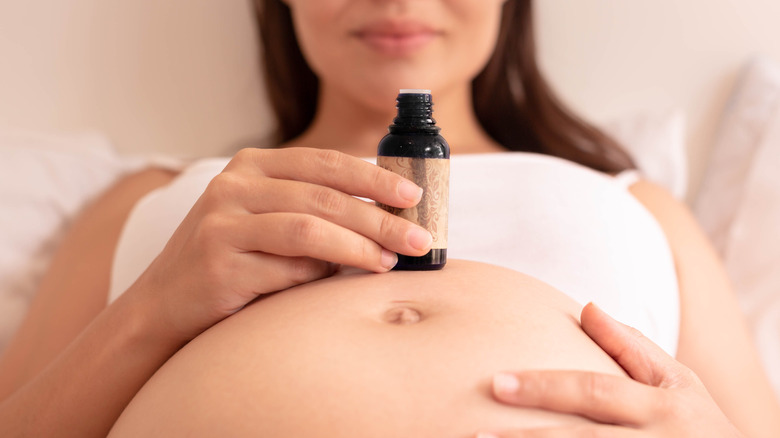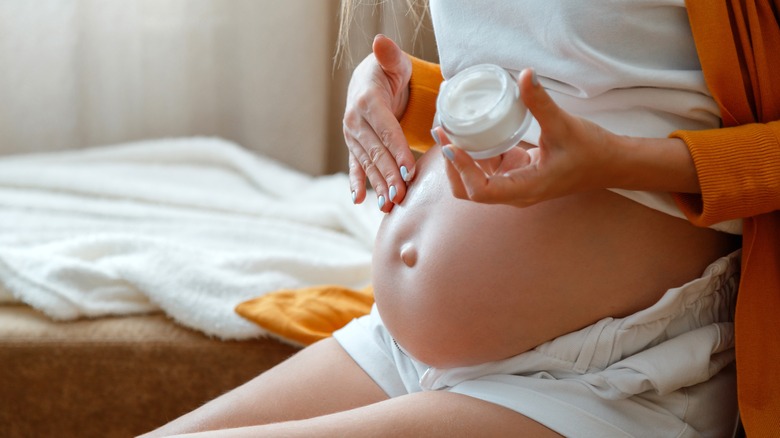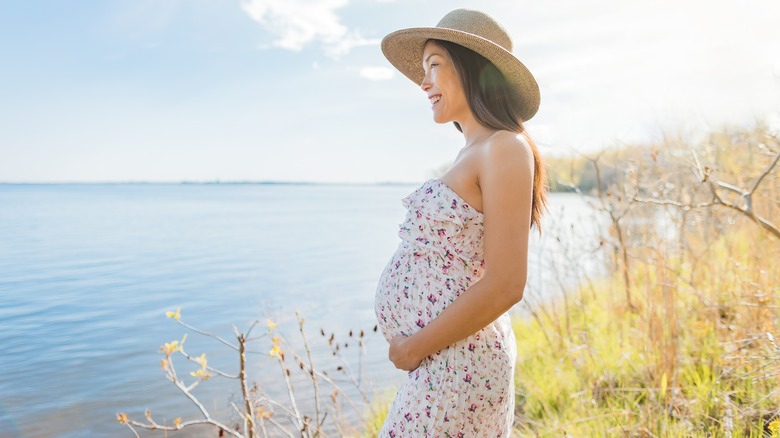Dermatologist Reveals The Skincare Ingredients Pregnant & Nursing Women Should Avoid – Exclusive
We may receive a commission on purchases made from links.
When you're growing a new life inside you, a lot changes. A baby is like a sponge, meaning anything you eat and do can influence their health, so you want to take care of yourself and eat nutritious food. And while changing hormones can affect your skin, products you use to treat your skin can also affect the baby, so it's extra important to choose skincare products with caution.
Tara Foley, the founder of clean beauty retailer Follain, told Byrdie, "For many women, pregnancy is the big push that gets them thinking about clean beauty. We want to stay far away from anything that could harm our baby, but there's a lot of uncertainty surrounding the safety of skincare for moms-to-be." Foley added that it's best not to take risks when using skincare ingredients, as the area doesn't have enough research, and it would be unethical to test them on pregnant women.
We spoke with board-certified dermatologist Dr. Karan Lal, an expert in pediatric and adult dermatology, who previously told us about getting preventative Botox. Dr. Lal told The List, "In medicine, we have a principle 'do no harm.' During pregnancy and breastfeeding, this applies not just to one life but to two! We do NOT take any risks when it comes to pregnant and/or breastfeeding women as these are temporary periods where the risks are greater than the benefits." Here, he's telling us exactly what ingredients pregnant and nursing women should stay away from.
Dr. Karan Lal recommends skipping these skincare ingredients during pregnancy and nursing
While not all of your favorite products are going to be considered unsafe for pregnant and breastfeeding women, some should not be used. Dr. Karan Lal, a cosmetic and medical dermatologist, recommends avoiding certain skincare ingredients even when trying to conceive. Dr. Lal told The List, "I usually tell all of my patients if they are trying to conceive that, they need to cut out their: topical retinoid, retinol, and hydroquinone." He added that it's uncertain to what extent these topical ingredients are absorbed into the bloodstream, potentially reaching the placenta, as most of these recommendations are based on theoretical risks. However, it's better to be safe.
Retinoids are known for their anti-aging benefits, but it seems best to set them aside during these times. Dr. Lal told us, "Retinoid and Retinols are all vitamin A derivatives, and high doses orally can cause bone, neurological, facial, and thymic birth defects which can be devastating. These are labeled pregnancy category C meaning animal reproduction studies have shown an adverse effect on the fetus, but there are no adequate and well-controlled studies in humans."
Though retinoids are miracle workers to help diminish fine lines and combat acne, it's one ingredient you shouldn't be using. "Those molecules have pretty good data showing that they can affect embryo development in the first trimester," Dr. Abigail Waldman of Mohs and Dermatologic Center at Brigham and Women's Hospital told The Strategist.
Pregnant and nursing women should avoid this sunscreen
According to Dr. Karan Lal, it's best to avoid ingredients like retinoids and hydroquinone from when you're considering getting pregnant until you are done breastfeeding. However, everyone needs sunscreen all the time. During this period, however, ensure you aren't using a chemical sunscreen. Sunscreen can be divided into two categories: physical and chemical. According to the American Academy of Dermatology Association (AAD), chemical sunscreen contains "one or more of the following active ingredients: oxybenzone, avobenzone, octisalate, octocrylene, homosalate, and octinoxate." They work by absorbing the sun's rays, while physical sunscreen works by reflecting the sun's rays.
Dr. Lal told The List, "Chemical sunscreens are absorbed into the bloodstream and are considered by some as being 'endocrine disruptors.' This risk of endocrine disruption is LOW, but it is not worth the risk during pregnancy. Similar to Retinoids, hydroquinone is considered pregnancy category C." It's best to switch to a physical sunscreen for sun protection while pregnant and nursing.
"Pregnancy hormones can cause increased skin pigmentation, such as melasma, and these can get even darker in the sun," Iffath Hoskins, an OB/GYN at NYU Langone Health in New York City, told What To Expect. LA-based board-certified dermatologist Jessica Wu recommends choosing a sunscreen with zinc oxide or titanium dioxide, the common active ingredients in physical sunscreens, per What To Expect. Dr. Wu recommends Supergoop Matte Screen SPF 40, as this physical sunscreen protects you from the sun and has anti-inflammatory benefits.


